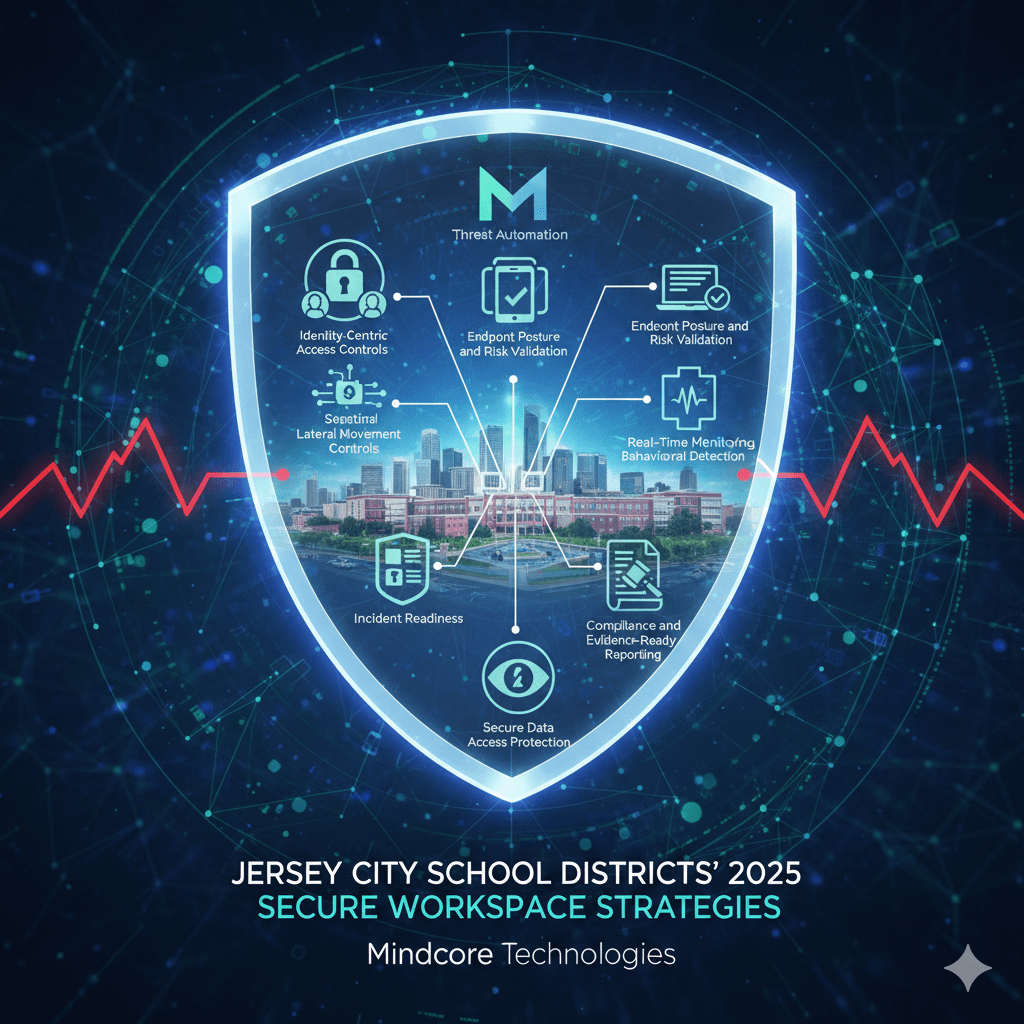(Updated in 2026)
If Jersey City school districts approach secure workspace as a nice-to-have remote access tool, they are already exposed to operational risk, data breaches, and continuity failures. Secure workspaces are not simply virtual desktops or screen-sharing portals — they must be engineered, governed, and monitored to defend against modern threats that probe identity, endpoints, and session workflows.
At Mindcore Technologies, we’ve seen education environments adopt “remote solutions” only to discover blind spots in security, access governance, and incident readiness. A safe workspace requires much more than connectivity.
Below is what actual secure workspace strategy looks like in 2025 — not theory, but operationally validated practice.
What Has Changed in 2025
The threat landscape and technology expectations for school districts have shifted dramatically:
- Identity is now the perimeter. Simply connecting a user isn’t enough — you must authenticate, contextualize, and govern who accesses what.
- Endpoints are everywhere. BYOD, staff laptops, student tablets — all connect from varied risk contexts.
- Threat automation is the norm. Attackers use credential stuffing, phishing, and lateral movement tools that operate faster than manual oversight can detect.
- Compliance scrutiny is increasing. Student records, PII, and protected data demand evidence-ready controls.
This isn’t legacy remote access — this is secure workspace orchestration across IT operations, identity governance, and threat monitoring.
1. Identity-Centric Access Controls
A workspace is only as secure as the identity model that sits in front of it.
We implement:
- Adaptive Multi-Factor Authentication (MFA) tied to risk signals
- Conditional Access Policies based on device posture, location, and time
- Least-Privilege Role Enforcement linked to student/staff roles
- Clear audit trails for every access attempt
Identity is the first defense boundary for a secure workspace.
Mindcore Technologies engineers identity governance that removes implicit trust and replaces it with verifiable, logged access decisions.
2. Endpoint Posture and Risk Validation
A remote session from a compromised device is as dangerous as an internal breach.
We enforce:
- Device posture checks before access is granted
- Continuous validation of security status
- Network risk assessment tied to workspace sessions
- Isolation for devices that fail posture checks
A secure workspace is not secure unless the device itself meets policy requirements.
3. Segmentation and Lateral Movement Controls
Once inside a workspace, users should only see what they are authorized to see.
We design:
- Network segmentation between student zones, administrative zones, and sensitive systems
- Micro-segmentation for high-risk access paths
- Policy fences that limit lateral movement if a breach occurs
This containment approach dramatically reduces blast radius when incidents happen.
4. Real-Time Monitoring and Behavioral Detection
Traditional logging is after-the-fact. Modern threats need active detection.
Mindcore integrates:
- Correlated telemetry from identity, endpoints, and workspace sessions
- Anomaly detection for unusual access patterns
- Real-time alerts tied to escalation workflows
- Automated triggers embedded in incident playbooks
Monitoring becomes an active defense — not a historical audit.
5. Incident Readiness With Workspace Integration
Secure workspaces must be part of the incident response (IR) playbook.
We build:
- Playbooks for credential theft, session anomalies, and lateral movement
- Automation for containment (e.g., session termination, account suspension)
- Forensic evidence capture tied to workspace activity
- Coordination templates for IT, security, and district leadership
If your IR plan doesn’t include workspace scenarios, it isn’t complete.
6. Secure Data Access and Protection
Student data, staff records, and administrative files are high-value targets.
We enforce:
- Policy-driven data access boundaries
- Encryption at rest and in transit
- Data Loss Prevention (DLP) tied to workspace workflows
- Access logging with retention policies for audit readiness
This turns data access from a compliance headache into a defensible system.
7. Compliance and Evidence-Ready Reporting
School districts face regulatory and public accountability for data handling.
Mindcore implements:
- Centralized evidence collection
- Continuous compliance reporting
- Identity-linked audit trails
- Automated documentation for reviews
Compliance isn’t an afterthought — it’s engineered into daily operations.
How Mindcore Technologies Enables Secure Workspace Strategy
Mindcore Technologies delivers secure workspace engineering that supports modern district needs:
- Identity and access governance for workspace access
- Endpoint posture enforcement
- Continuous, correlated monitoring and threat detection
- Role-based segmentation and policy fences
- Integrated incident response workflows
- Data protection, encryption, and DLP
- Audit-ready compliance evidence pipelines
- Performance-aware architecture that supports school workflows
We don’t just deploy secure workspaces — we integrate them into unified operational defense and continuity frameworks.
What Jersey City School Districts Should Do Now
Here are actionable steps:
- Map access policies by role (students, staff, admins) before provisioning workspaces
- Enforce adaptive MFA on every session
- Integrate endpoint posture checks with access policies
- Correlate workspace logs with SIEM and response systems
- Test incident response with workspace-specific scenarios
- Segment networks and restrict lateral access
- Build continuous evidence pipelines for compliance
These actions move you from hope-based security to operational defense.
Final Thought
Secure workspace strategies in 2025 are fundamentally identity-defined, threat-aware, and continuity-oriented. They are not simply remote desktops or access portals — they are engineered operational environments that enforce policy, detect threats, and integrate with response and compliance.
If your current approach to secure workspaces still treats them as utilities, you are leaving gaps in identity, data protection, and operational readiness.
At Mindcore Technologies, we build secure workspaces that are:
- Defensible
- Monitored
- Governed
- Aligned to risk
- Integrated with business continuity
That’s how school districts stay secure, stay compliant, and keep teaching and learning uninterrupted.

